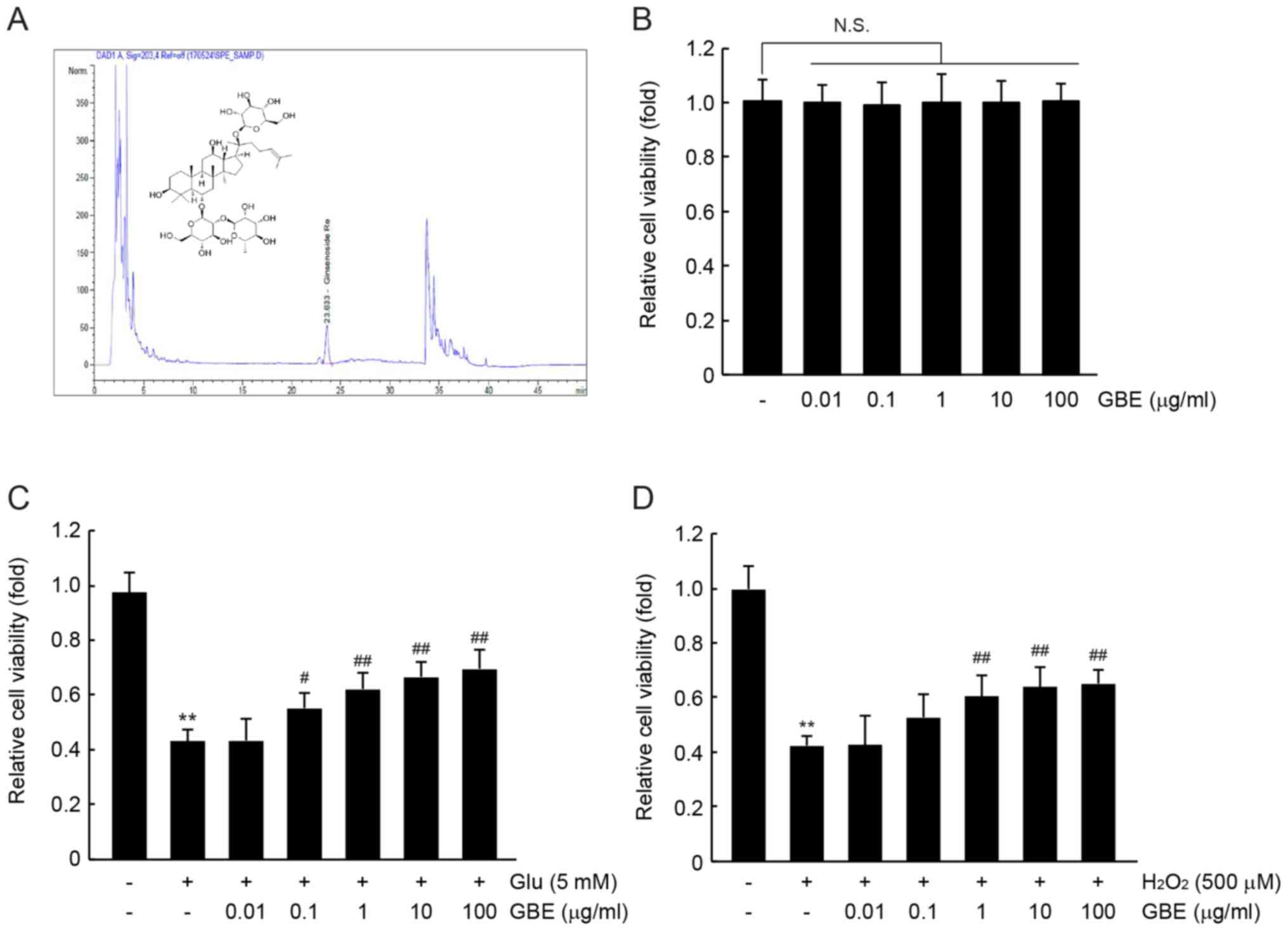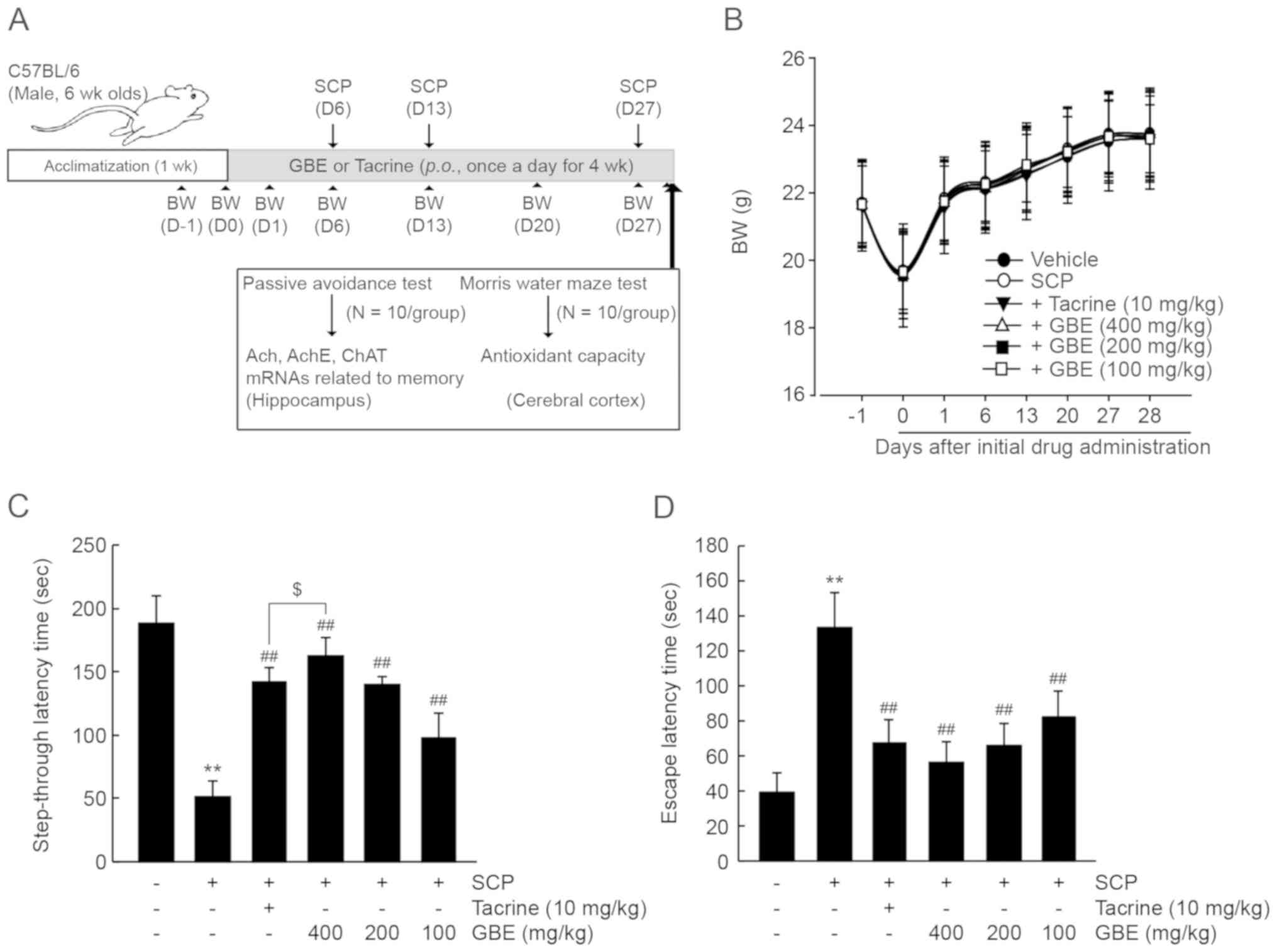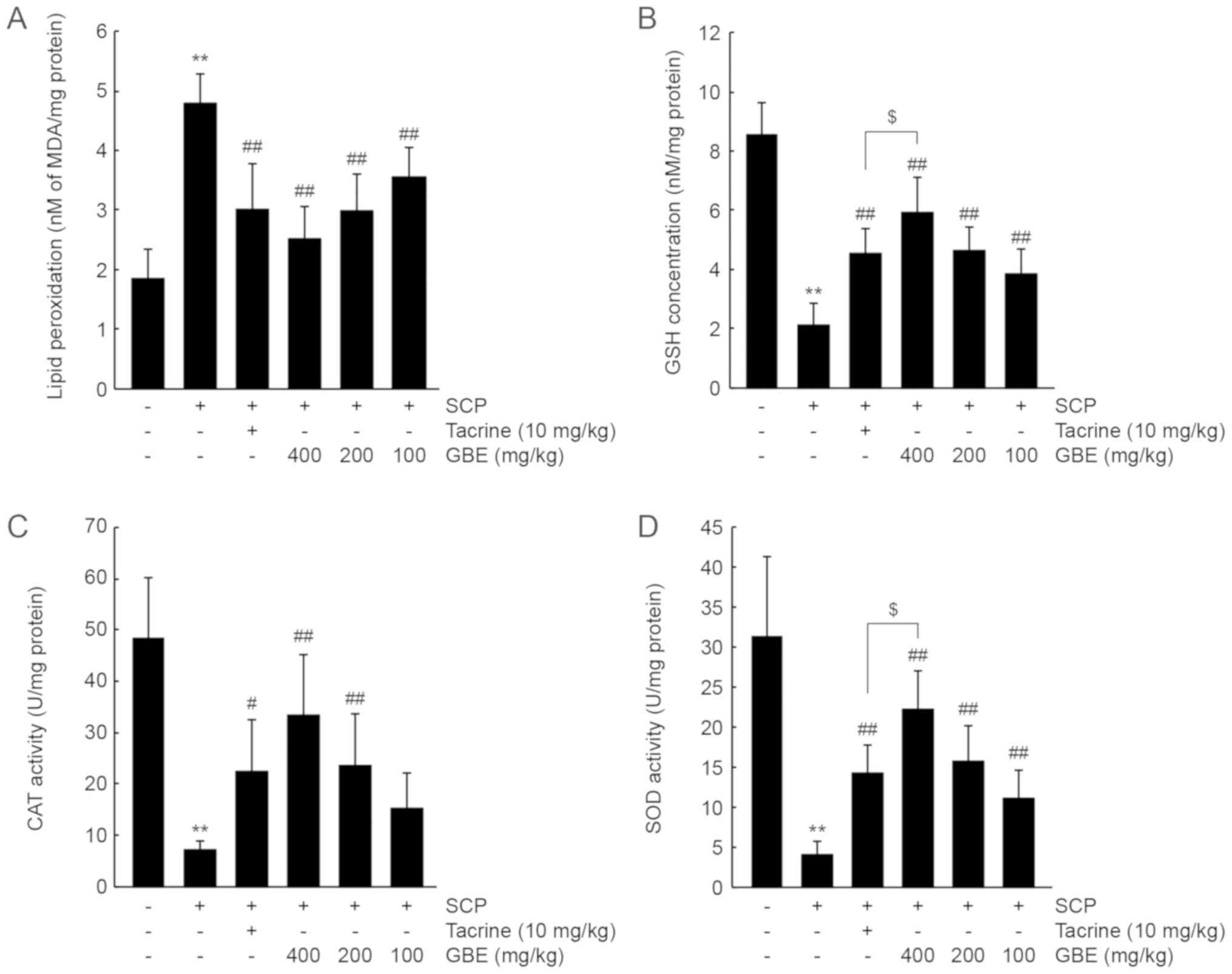|
1
|
Burns A and Iliffe S: Alzheimer's disease.
BMJ. 338:b1582009. View
Article : Google Scholar : PubMed/NCBI
|
|
2
|
Golde TE: Disease modifying therapy for
AD? J Neurochem. 99:689–707. 2006. View Article : Google Scholar : PubMed/NCBI
|
|
3
|
Francis PT, Palmer AM, Snape M and Wilcock
GK: The cholinergic hypothesis of Alzheimer's disease: A review of
progress. J Neurol Neurosurg Psychiatry. 66:137–147. 1999.
View Article : Google Scholar : PubMed/NCBI
|
|
4
|
Ibach B and Haen E: Acetylcholinesterase
inhibition in Alzheimer's Disease. Curr Pharm Des. 10:231–251.
2004. View Article : Google Scholar : PubMed/NCBI
|
|
5
|
Rountree SD, Chan W, Pavlik VN, Darby EJ,
Siddiqui S and Doody RS: Persistent treatment with cholinesterase
inhibitors and/or memantine slows clinical progression of Alzheimer
disease. Alzheimers Res Ther. 1:72009. View
Article : Google Scholar : PubMed/NCBI
|
|
6
|
Kim CK, Cho DH, Lee KS, Lee DK, Park CW,
Kim WG, Lee SJ, Ha KS, Goo Taeg O, Kwon YG and Kim YM: Ginseng
berry extract prevents atherogenesis via anti-inflammatory action
by upregulating phase II gene expression. Evid Based Complement
Alternat Med. 2012:4903012012. View Article : Google Scholar : PubMed/NCBI
|
|
7
|
Kim YK, Yoo DS, Xu H, Park NI, Kim HH,
Choi JE and Park SU: Ginsenoside content of berries and roots of
three typical Korean ginseng (Panax ginseng) cultivars. Nat
Prod Commun. 4:903–906. 2009.PubMed/NCBI
|
|
8
|
In-Ho C, Byung-Woo K, Yun-Jae P, Han-Joo
L, Sok P and Namju L: Ginseng berry extract increases nitric oxide
level in vascular endothelial cells and improves cGMP expression
and blood circulation in muscle cells. J Exerc Nutrition Biochem.
22:6–13. 2018. View Article : Google Scholar : PubMed/NCBI
|
|
9
|
Dey L, Xie JT, Wang A, Wu J, Maleckar SA
and Yuan CS: Anti-hyperglycemic effects of ginseng: Comparison
between root and berry. Phytomedicine. 10:600–605. 2003. View Article : Google Scholar : PubMed/NCBI
|
|
10
|
Seo E, Kim S, Lee SJ, Oh BC and Jun HS:
Ginseng berry extract supplementation improves age-related decline
of insulin signaling in mice. Nutrients. 7:3038–3053. 2015.
View Article : Google Scholar : PubMed/NCBI
|
|
11
|
Yang SO, Park HR, Sohn ES, Lee SW, Kim HD,
Kim YC, Kim KH, Na SW, Choi HK, Arasu MV and Kim YO: Classification
of ginseng berry (Panax ginseng C.A. MEYER) extract using 1H
NMR spectroscopy and its inhibition of lipid accumulation in 3T3-L1
cells. BMC Complement Altern Med. 14:4552014. View Article : Google Scholar : PubMed/NCBI
|
|
12
|
Kim MH, Lee J, Jung S, Kim JW, Shin JH and
Lee HJ: The involvement of ginseng berry extract in blood flow via
regulation of blood coagulation in rats fed a high-fat diet. J
Ginseng Res. 41:120–126. 2017. View Article : Google Scholar : PubMed/NCBI
|
|
13
|
Ma ZN, Liu Z, Wang Z, Ren S, Tang S, Wang
YP, Xiao SY, Chen C and Li W: Supplementation of American ginseng
berry extract mitigated cisplatin-evoked nephrotoxicity by
suppressing ROS-mediated activation of MAPK and NF-κB signaling
pathways. Food Chem Toxicol. 110:62–73. 2017. View Article : Google Scholar : PubMed/NCBI
|
|
14
|
Xu XY, Wang Z, Ren S, Leng J, Hu JN, Liu
Z, Chen C and Li W: Improved protective effects of American ginseng
berry against acetaminophen-induced liver toxicity through
TNF-α-mediated caspase-3/-8/-9 signaling pathways. Phytomedicine.
51:128–138. 2018. View Article : Google Scholar : PubMed/NCBI
|
|
15
|
Zhang W, Xu L, Cho SY, Min KJ, Oda T,
Zhang L, Yu Q and Jin JO: Ginseng berry extract attenuates dextran
sodium sulfate-induced acute and chronic colitis. Nutrients.
8:1992016. View Article : Google Scholar : PubMed/NCBI
|
|
16
|
Seo JY, Ju SH, Oh J, Lee SK and Kim JS:
Neuroprotective and cognition-enhancing effects of compound K
isolated from red ginseng. J Agric Food Chem. 64:2855–2864. 2016.
View Article : Google Scholar : PubMed/NCBI
|
|
17
|
Maurice T, Lockhart BP and Privat A:
Amnesia induced in mice by centrally administered beta-amyloid
peptides involves cholinergic dysfunction. Brain Res. 706:181–193.
1996. View Article : Google Scholar : PubMed/NCBI
|
|
18
|
Kim J, Kim SH, Lee DS, Lee DJ, Kim SH,
Chung S and Yang HO: Effects of fermented ginseng on memory
impairment and β-amyloid reduction in Alzheimer's disease
experimental models. J Ginseng Res. 37:100–107. 2013. View Article : Google Scholar : PubMed/NCBI
|
|
19
|
Morris R: Development of a water maze
procedure for studying spatial learning in the rat. J Neurosci
Methods. 11:47–60. 1984. View Article : Google Scholar : PubMed/NCBI
|
|
20
|
Livak KJ and Schmittgen TD: Analysis of
relative gene expression data using real-time quantitative PCR and
the 2(-Delta Delta C(T)) method. Methods. 25:402–408. 2001.
View Article : Google Scholar : PubMed/NCBI
|
|
21
|
Lee JW, Choi BR, Kim YC, Choi DJ, Lee YS,
Kim GS, Baek NI, Kim SY and Lee DY: Comprehensive profiling and
quantification of ginsenosides in the root, stem, leaf, and berry
of Panax ginseng by UPLC-QTOF/MS. Molecules. 22:E21472017.
View Article : Google Scholar : PubMed/NCBI
|
|
22
|
Nakajo Y, Miyamoto S, Nakano Y, Xue JH,
Hori T and Yanamoto H: Genetic increase in brain-derived
neurotrophic factor levels enhances learning and memory. Brain Res.
1241:103–109. 2008. View Article : Google Scholar : PubMed/NCBI
|
|
23
|
Cunha C, Brambilla R and Thomas KL: A
simple role for BDNF in learning and memory? Front Mol Neurosci.
3:12010.PubMed/NCBI
|
|
24
|
Martin SJ, Grimwood PD and Morris RG:
Synaptic plasticity and memory: An evaluation of the hypothesis.
Annu Rev Neurosci. 23:649–711. 2000. View Article : Google Scholar : PubMed/NCBI
|
|
25
|
Yang Q, Lin J, Zhang H, Liu Y, Kan M, Xiu
Z, Chen X, Lan X, Li X, Shi X, et al: Ginsenoside compound K
regulates amyloid β via the Nrf2/Keap1 signaling pathway in mice
with scopolamine hydrobromide-induced memory impairments. J Mol
Neurosci. 67:62–71. 2019.PubMed/NCBI
|
|
26
|
Lu C, Lv J, Dong L, Jiang N, Wang Y, Wang
Q, Li Y, Chen S, Fan B, Wang F and Liu X: Neuroprotective effects
of 20(S)-protopanaxatriol (PPT) on scopolamine-induced cognitive
deficits in mice. Phytother Res. 32:1056–1063. 2018. View Article : Google Scholar : PubMed/NCBI
|
|
27
|
Kim J, Shim J, Lee S, Cho WH, Hong E, Lee
JH, Han JS, Lee HJ and Lee KW: Rg3-enriched ginseng extract
ameliorates scopolamine-induced learning deficits in mice. BMC
Complement Altern Med. 16:662016. View Article : Google Scholar : PubMed/NCBI
|
|
28
|
Xu T, Shen X, Yu H, Sun L, Lin W and Zhang
C: Water-soluble ginseng oligosaccharides protect against
scopolamine-induced cognitive impairment by functioning as an
antineuroinflammatory agent. J Ginseng Res. 40:211–219. 2016.
View Article : Google Scholar : PubMed/NCBI
|
|
29
|
Peña ID, Yoon SY, Kim HJ, Park S, Hong EY,
Ryu JH, Park IH and Cheong JH: Effects of ginseol k-g3, an
Rg3-enriched fraction, on scopolamine-induced memory impairment and
learning deficit in mice. J Ginseng Res. 38:1–7. 2014. View Article : Google Scholar : PubMed/NCBI
|
|
30
|
Jin SH, Park JK, Nam KY, Park SN and Jung
NP: Korean red ginseng saponins with low ratios of protopanaxadiol
and protopanaxatriol saponin improve scopolamine-induced learning
disability and spatial working memory in mice. J Ethnopharmacol.
66:123–129. 1999. View Article : Google Scholar : PubMed/NCBI
|
|
31
|
Li J, Liu Y, Li W, Wang Z, Guo P, Li L and
Li N: Metabolic profiling of the effects of ginsenoside Re in an
Alzheimer's disease mouse model. Behav Brain Res. 337:160–172.
2018. View Article : Google Scholar : PubMed/NCBI
|
|
32
|
Chen F, Eckman EA and Eckman CB:
Reductions in levels of the Alzheimer's amyloid beta peptide after
oral administration of ginsenosides. FASEB J. 20:1269–1271. 2006.
View Article : Google Scholar : PubMed/NCBI
|
|
33
|
Du Y, Fu M, Wang YT and Dong Z:
Neuroprotective effects of ginsenoside Rf on amyloid-β-induced
neurotoxicity in vitro and in vivo. J Alzheimers Dis. 64:309–322.
2018. View Article : Google Scholar : PubMed/NCBI
|
|
34
|
Liu JF, Yan XD, Qi LS, Li L, Hu GY, Li P
and Zhao G: Ginsenoside Rd attenuates Aβ25-35-induced oxidative
stress and apoptosis in primary cultured hippocampal neurons. Chem
Biol Interact. 239:12–18. 2015. View Article : Google Scholar : PubMed/NCBI
|
|
35
|
Wang Q, Sun LH, Jia W, Liu XM, Dang HX,
Mai WL, Wang N, Steinmetz A, Wang YQ and Xu CJ: Comparison of
ginsenosides Rg1 and Rb1 for their effects on improving
scopolamine-induced learning and memory impairment in mice.
Phytother Res. 24:1748–1754. 2010. View Article : Google Scholar : PubMed/NCBI
|
|
36
|
Klinkenberg I and Blokland A: The validity
of scopolamine as a pharmacological model for cognitive impairment:
A review of animal behavioral studies. Neurosci Biobehav Rev.
34:1307–1350. 2010. View Article : Google Scholar : PubMed/NCBI
|
|
37
|
Lorenzini CA, Baldi E, Bucherelli C,
Sacchetti B and Tassoni G: Role of dorsal hippocampus in
acquisition, consolidation and retrieval of rat's passive avoidance
response: A tetrodotoxin functional inactivation study. Brain Res.
730:32–39. 1996. View Article : Google Scholar : PubMed/NCBI
|
|
38
|
Barnes CA, Danysz W and Parsons CG:
Effects of the uncompetitive NMDA receptor antagonist memantine on
hippocampal long-term potentiation, short-term exploratory
modulation and spatial memory in awake, freely moving rats. Eur J
Neurosci. 8:565–571. 1996. View Article : Google Scholar : PubMed/NCBI
|
|
39
|
Madara JC and Levine ES: Presynaptic and
postsynaptic NMDA receptors mediate distinct effects of
brain-derived neurotrophic factor on synaptic transmission. J
Neurophysiol. 100:3175–3184. 2008. View Article : Google Scholar : PubMed/NCBI
|
|
40
|
Korte M, Carroll P, Wolf E, Brem G,
Thoenen H and Bonhoeffer T: Hippocampal long-term potentiation is
impaired in mice lacking brain-derived neurotrophic factor. Proc
Natl Acad Sci USA. 92:8856–8860. 1995. View Article : Google Scholar : PubMed/NCBI
|
|
41
|
Segal RA: Selectivity in neurotrophin
signaling: Theme and variations. Annu Rev Neurosci. 26:299–310.
2003. View Article : Google Scholar : PubMed/NCBI
|
|
42
|
Bozon B, Kelly A, Josselyn SA, Silva AJ,
Davis S and Laroche S: MAPK, CREB and zif268 are all required for
the consolidation of recognition memory. Philos Trans R Soc Lond B
Biol Sci. 358:805–814. 2003. View Article : Google Scholar : PubMed/NCBI
|
|
43
|
Korte M, Kang H, Bonhoeffer T and Schuman
E: A role of BDNF in the late-phase of hippocampal long-term
potentiation. Neuropharmacology. 37:553–559. 1998. View Article : Google Scholar : PubMed/NCBI
|
|
44
|
Singh A, Kukreti R, Saso L and Kukreti S:
Oxidative stress: A key modulator in neurodegenerative diseases.
Molecules. 24:E15832019. View Article : Google Scholar : PubMed/NCBI
|
|
45
|
Olanow CW: An introduction to the free
radical hypothesis in Parkinson's disease. Ann Neurol. 32
(Suppl):S2–S9. 1992. View Article : Google Scholar : PubMed/NCBI
|
|
46
|
Liu L, Vollmer MK, Ahmad AS, Fernandez VM,
Kim H and Doré S: Pretreatment with Korean red ginseng or dimethyl
fumarate attenuates reactive gliosis and confers sustained
neuroprotection against cerebral hypoxic-ischemic damage by an
Nrf2-dependent mechanism. Free Radic Biol Med. 131:98–114. 2019.
View Article : Google Scholar : PubMed/NCBI
|
|
47
|
Sivandzade F, Prasad S, Bhalerao A and
Cucullo L: NRF2 and NF-κB interplay in cerebrovascular and
neurodegenerative disorders: Molecular mechanisms and possible
therapeutic approaches. Redox Biol. 21:1010592019. View Article : Google Scholar : PubMed/NCBI
|
|
48
|
Lee MR, Yun BS, Park SY, Ly SY, Kim SN,
Han BH and Sung CK: Anti-amnesic effect of Chong-Myung-Tang on
scopolamine-induced memory impairments in mice. J Ethnopharmacol.
132:70–74. 2010. View Article : Google Scholar : PubMed/NCBI
|


















